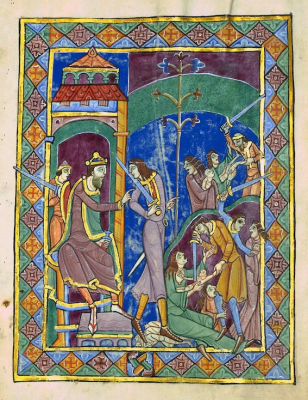Gospel in Art: Saint Alban, First Martyr of England

Massacre of the Innocents. Leaf from the Saint Albans Psalter, one of several psalters known to have been created at or for St Albans Abbey in the 12th century © Dombibliot
Source: Christian Art
Gospel of 20 June 2025
Matthew 6:19-23
At that time: Jesus said to his disciples, 'Do not lay up for yourselves treasures on earth, where moth and rust destroy and where thieves break in and steal, but lay up for yourselves treasures in heaven, where neither moth nor rust destroys and where thieves do not break in and steal. For where your treasure is, there your heart will be also.
'The eye is the lamp of the body. So, if your eye is healthy, your whole body will be full of light, but if your eye is bad, your whole body will be full of darkness. If then the light in you is darkness, how great is the darkness!'
Reflection on the Illuminated Manuscript Psalter
Saint Alban is venerated as the first-recorded British Christian martyr and, therefore, as the British protomartyr. Along with fellow Saints Julius and Aaron, Alban is one of three named martyrs recorded at an early date from Roman Britain. He is believed to have lived during the late 3rd or early 4th century in the Roman city of Verulamium, which is modern-day St Albans, Hertfordshire. Alban was a pagan Roman soldier who converted to Christianity. The pivotal moment in his life came when he sheltered a Christian priest, known as Amphibalus, who was fleeing persecution. Deeply moved by the priest's faith and piety, Alban converted to Christianity and was baptised. When Roman soldiers came searching for the priest, Alban exchanged clothes with him to allow the priest to escape. As a result, Alban was arrested and brought before the Roman authorities. Despite being threatened, he refused to renounce his new faith. Alban was sentenced to death. As he was led to his execution, various miracles were reported, such as the drying up of a river to allow him to cross. At the execution site, a miraculous spring of water appeared, and the executioner's eyes reportedly fell out after he executed Alban. He was beheaded on what is now known as Holywell Hill, around AD 250.
Saint Albans Abbey, located in the town of St Albans, Hertfordshire, was founded in the 8th century. The abbey was rebuilt and greatly expanded in the 11th century, especially under the leadership of Abbot Paul of Caen after the Norman Conquest. By the 12th century, it had become one of the most prominent Benedictine monasteries in England, known for its scholarship, artistic production, and liturgical life.
Among the treasures produced at the abbey is the magnificent St Albans Psalter, also known as the Albani Psalter or the Psalter of Christina of Markyate. Created in the mid-12th century, it is an outstanding example of English Romanesque illumination, remarkable for its richness, complexity, and scale. The manuscript contains over forty full-page miniatures, many of which introduced iconographic themes that would influence Christian art for generations. Our illustrations depicts the Massacre of the Innocents. Lavishly decorated, the psalter is believed to have been commissioned by Abbot Geoffrey de Gorham, and closely connected to Christina of Markyate, a noblewoman and anchoress associated with the abbey. Uniquely, it also includes the earliest surviving passage of French literature, the Chanson de Saint Alexis, adding to its cultural significance. Today, the St Albans Psalter is widely regarded as one of the finest and most innovative illuminated manuscripts of medieval England.
LINKS
Gospel in Art: https://christian.art/
Today's Reflection: https://christian.art/daily-gospel-reading/matthew-6-19-23-2025/ (with audio)


















